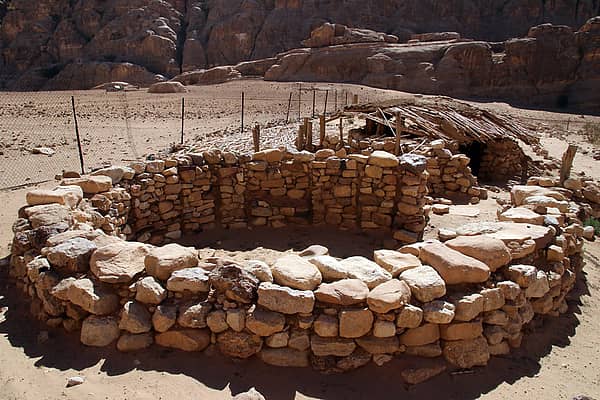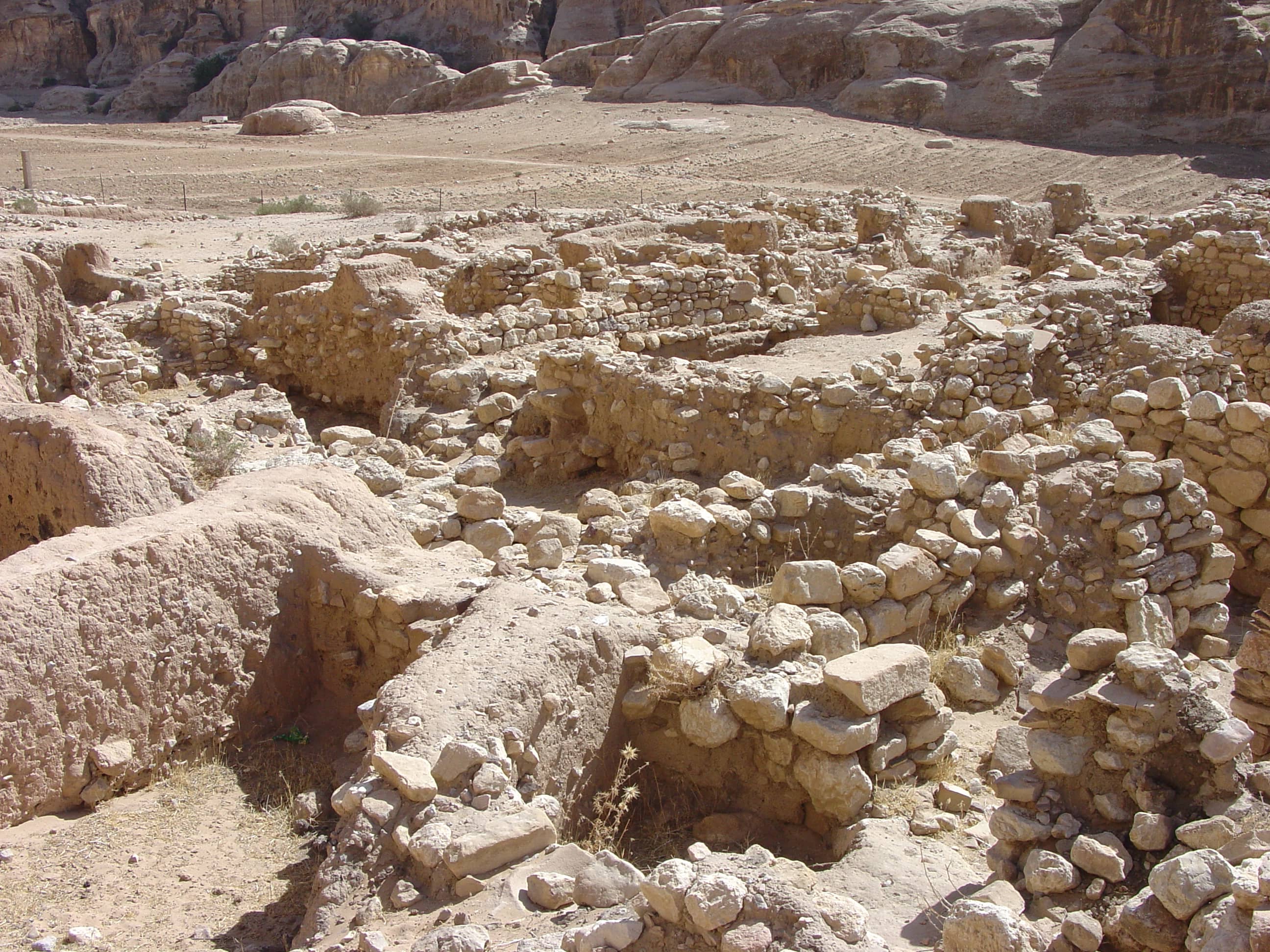Beidha Neolithic Village
Step back 11,000 years at Beidha, one of the world's earliest permanent settlements, revealing the dawn of agriculture and settled life.

Highlights
Must-see attractions

Social
From TikTok & Reddit
Best Time
Beat the midday sun
Beidha Neolithic Village
Best Time
Beat the midday sun

Highlights
Must-see attractions
Step back 11,000 years at Beidha, one of the world's earliest permanent settlements, revealing the dawn of agriculture and settled life.
"A little-noticed site of great importance, offering vivid insights into an early stage of human civilization."
Wear Comfortable Shoes
The terrain is uneven; sturdy walking shoes are essential for exploring the archaeological site comfortably. :athletic_shoe:
Bring Plenty of Water
There's minimal shade, so staying hydrated is crucial, especially during warmer months. :droplet:
Highlights
Discover the most iconic attractions and experiences

Reconstructed Neolithic Houses
Entrance of the village
Life-size reconstructions offer a vivid look at how early humans lived, built homes, and transitioned to settled life.

Archaeological Excavation Site
Main village area
Explore the well-preserved remains of one of the world's oldest permanent settlements, showcasing architectural evolution.

Ritual Site Discoveries
Near residential area
Uncover evidence of early spiritual practices with unique structures and large stone basins, hinting at ancient beliefs.
Plans like a pro.
Thinks like you
Planning Your Visit
Ancient History Awaits
Sun Protection is Key
Best Times
Insider Tips
from TikTok, Instagram & Reddit
Wear Comfortable Shoes
The terrain is uneven; sturdy walking shoes are essential for exploring the archaeological site comfortably. :athletic_shoe:
Bring Plenty of Water
There's minimal shade, so staying hydrated is crucial, especially during warmer months. :droplet:
Combine with Little Petra
Beidha is a short walk from Little Petra, making it easy to visit both sites in one trip. :world_map:
Focus on Early History
Appreciate Beidha for its deep historical significance, not for grand monuments like Petra. :ancient_ruins:
Tips
from all over the internet
Wear Comfortable Shoes
The terrain is uneven; sturdy walking shoes are essential for exploring the archaeological site comfortably. :athletic_shoe:
Bring Plenty of Water
There's minimal shade, so staying hydrated is crucial, especially during warmer months. :droplet:
Combine with Little Petra
Beidha is a short walk from Little Petra, making it easy to visit both sites in one trip. :world_map:
Focus on Early History
Appreciate Beidha for its deep historical significance, not for grand monuments like Petra. :ancient_ruins:
What Travellers Say
Reviews Summary
Visitors praise Beidha for its immense historical significance as one of the world's earliest settlements, offering unique insights into Neolithic life and the dawn of civilization. The reconstructed houses and explanatory panels are highlighted as particularly valuable for understanding the past. However, some find it less visually spectacular than Petra and note the lack of shade.
"Loved it, but unless you're really interested in really ancient history, you may be disappointed. There are no large monuments like there are at Petra as this is one of the earliest settlements on earth. A word of care... there is little shade here!"
Steve Wood
"A very important historical place"
dawsar Tarawneh
"A little-noticed site of great importance. Inhabited as early as 11,000 BC, the Natufian culture was the first Neolithic settlement. The Neolithic village at Beidha (also called Bayda) is located about 9 km from the Petra Visitor Center and 800 m from the entrance to the Siq al-Barid (Little Petra). This well-preserved and educationally presented archaeological site provides vivid insights into an early stage of human civilization. It provides an idea of how people lived during the final phase of the Stone Age 10,000 years ago, when agriculture and animal husbandry began. This change in food production marked the transition to a sedentary lifestyle. Permanent settlements like Beidha emerged, and social structures and symbolic belief systems became more complex.
The village of Beidha was inhabited from approximately 8,500 to 5,500 BC. The architectural traces found there reveal the transition from round buildings to houses with rectangular shapes, which could be easily expanded and densified, and also allowed for upper floors. This was an important factor as the population grew and depended on a stable food supply from barley cultivation and goat herding. A group of oval-shaped structures about 40 meters from the residential area, including unusually large slabs with flat, rounded hollows, upright stones, and a large basin, appears to have been a ritual site.
At the entrance to the village, archaeologists have reconstructed life-size Neolithic houses based on evidence found at the site. These reconstructions, along with the paths and information panels, help visitors retrace the layout of the settlement and understand how the ancient community might have lived. A must-see for archaeology enthusiasts"
EE
What People Like
What People Dislike
Frequently Asked Questions
🚇 🗺️ Getting There
Beidha is conveniently located about 9 km from the Petra Visitor Center and 800 meters from Little Petra. You can reach it via a short, pleasant walk from Little Petra, which is often preferred by hikers. Some visitors opt for a jeep to the trailhead to save time.
While direct public transport to Beidha might be limited, it's easily accessible as a stop when visiting Little Petra. Taxis or rental cars are common ways to reach the general area from Wadi Musa (the town near Petra).
Yes, there's a popular hiking route that starts from Siq al-Barid (Little Petra) and passes through Beidha Neolithic Village on its way to Petra's Monastery. This offers a scenic and historical journey.
Beidha Neolithic Village is situated approximately 800 meters from the entrance of Little Petra, making it a very short and easy walk between the two sites.
Parking is generally available near Little Petra, and from there, it's a short walk to Beidha. If arriving by private vehicle, follow signs for Little Petra.
🎫 🎫 Tickets & Entry
Entry to Beidha is often included with your Petra Pass or can be purchased separately. It's advisable to check current ticketing policies with the Petra authorities before your visit.
Beidha generally follows the opening hours of nearby archaeological sites like Little Petra. It's typically open from early morning until late afternoon. Confirm hours locally to avoid disappointment.
While sometimes bundled with Petra or Little Petra tickets, there might be a small separate fee. It's a worthwhile investment for such a significant historical site.
It's best to visit during daylight hours to fully appreciate the site and its explanatory panels. Late afternoon offers softer light for photography.
While official guided tours might be less common than for Petra, local guides can often be hired at Little Petra who can provide insights into Beidha's history.
🎫 🧭 Onsite Experience
Most visitors spend about twenty minutes to an hour exploring Beidha, depending on their interest in early history and how thoroughly they read the explanatory panels.
You'll see reconstructed Neolithic houses, the excavated remains of the ancient settlement, and a ritual site. Informative panels explain the significance of each area.
Children can find the reconstructed houses interesting, but the site's historical depth might be more appreciated by older children or adults. Ensure they have sun protection.
Restroom facilities are typically available at the nearby Little Petra site. It's advisable to use them there before heading to Beidha.
Beidha is considered one of the earliest permanent settlements in human history, dating back to around 11,000 BC, marking a crucial transition to agriculture and settled life.
📸 📸 Photography
Late afternoon offers beautiful, soft light that enhances the textures of the ancient stones and reconstructions. Early mornings are also good before the sun gets too harsh.
Drone usage is generally restricted at archaeological sites in Jordan to protect the heritage and for safety reasons. Always check local regulations before flying.
Capture the unique architecture of the reconstructed houses, the details of the ancient ruins, and the surrounding desert landscape. The explanatory panels also offer interesting visual elements.
Visiting during off-peak hours, like early mornings or late afternoons, will significantly reduce crowds and make it easier to get unobstructed shots.
A wide-angle lens is useful for capturing the reconstructed houses and the expanse of the site. A standard zoom lens will cover most needs. Don't forget a polarizing filter for the desert light. :camerawithflash:
For Different Travelers
Tailored advice for your travel style
👨👩👧 Families with Kids
However, it's important to note that the site is primarily archaeological remains with limited interactive elements. Ensure children are supervised, wear comfortable shoes for uneven terrain, and have plenty of water and sun protection due to the lack of shade.
🏛️ History Buffs & Archaeology Enthusiasts
The site's well-preserved remains, coupled with the informative panels and reconstructions, offer a deep dive into early human ingenuity. It's a chance to walk through history and appreciate the foundational steps that led to modern society. Combine your visit with Little Petra for a comprehensive exploration of ancient human activity in the region.
🚶♀️ Hikers & Adventure Seekers
Consider incorporating Beidha into a longer hike. While the site itself is a quick visit, the journey to and from it, especially via the trails from Little Petra, provides a rewarding adventure. Remember to carry ample water and wear appropriate gear for the terrain.
Deep Dives
In-depth insights and expert knowledge
The Dawn of Civilization: Beidha's Historical Importance
The archaeological evidence at Beidha reveals a fascinating architectural evolution. Initially, inhabitants lived in round buildings, which gradually transitioned to rectangular houses. This change was significant, allowing for easier expansion, densification, and the development of upper floors – crucial adaptations as populations grew and relied on stable food sources like barley and goat herding. The site provides tangible proof of how early humans adapted their living spaces to meet the demands of a new way of life.
Beyond domestic life, Beidha also offers clues into early spiritual practices. A group of oval structures, distinct from the residential areas, is believed to have served as a ritual site. The presence of unusually large slabs with hollows, upright stones, and a large basin suggests organized ceremonies or symbolic activities. These discoveries are vital for understanding the development of social structures and symbolic belief systems in the nascent stages of civilization.
Exploring Beidha: What to Expect on Site
The main archaeological area allows you to explore the well-preserved remains of the village. Informative panels are strategically placed throughout the site, providing context and details about the excavated structures, their purpose, and their historical significance. These panels are crucial for understanding the transition from round to rectangular dwellings and the overall layout of the settlement.
Don't miss the ritual site located a short distance from the residential area. The unique arrangement of stones and basins offers a glimpse into the spiritual or ceremonial practices of the Beidha inhabitants. The entire visit is relatively short, typically taking around twenty minutes to an hour, making it an accessible yet deeply informative experience for anyone interested in ancient history.
Social
from TikTok, Instagram & Reddit